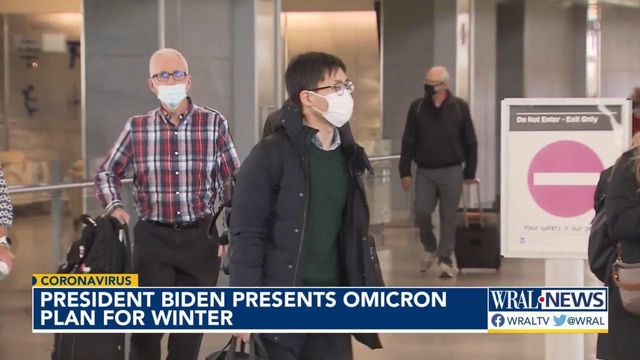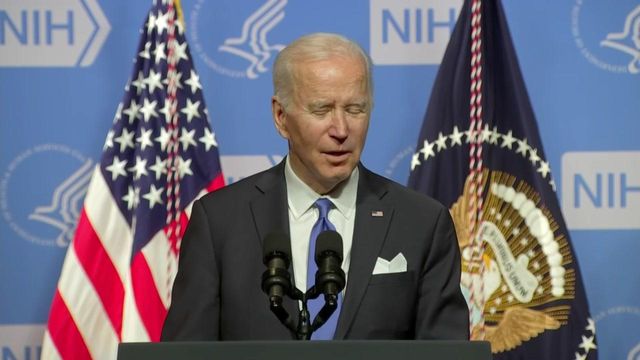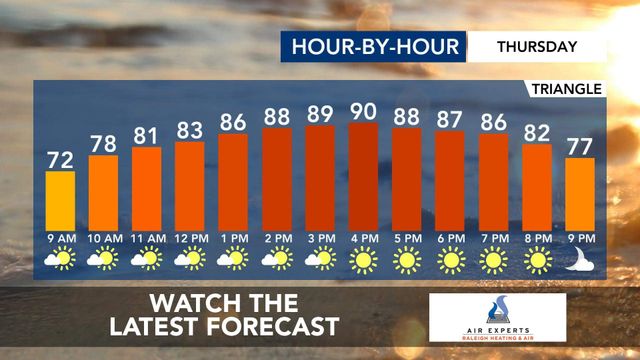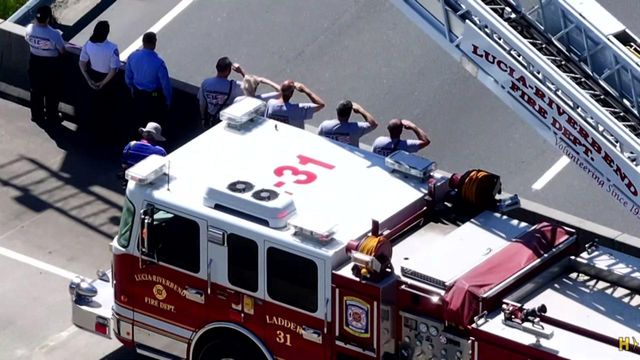Biden Vows to Fight Omicron With 'Science and Speed, Not Chaos and Confusion'
President Joe Biden, confronting a worrisome new coronavirus variant and the potential of a winter surge, laid out a new pandemic strategy on Thursday that includes hundreds of vaccination sites aimed at families, booster shots for all adults, new testing requirements for international travelers and free at-home tests that will be covered by private insurers or available at community health centers.
The push to expand access to at-home testing is a tacit acknowledgment by the White House that vaccination, which the president has touted as the path out of the pandemic, is not enough on its own. Experts have argued for months that masks and testing are also essential, and the need for testing will become even more urgent if the new omicron variant is found to evade protection from vaccines, which has not yet been established.
“We’re going to fight this variant with science and speed, not chaos and confusion,” the president said at the National Institutes of Health.
Biden’s announcement comes a day after the omicron variant was detected in the United States for the first time, in California. On Thursday, a second case was reported, in a Minnesota resident who had recently traveled to New York City.
Local experts said while they don't know how dangerous omicron is, they know its quickly spreading.
"It spreads very, very quickly in South Africa, where most of the population had some level of immunity to the virus," according to Dr. Pia McDonald, an infectious disease expert who spoke with WRAL News on Thursday.
Conquering the pandemic — or at least bringing it under control — is by far Biden’s most daunting task, and it is especially complicated because it has become so divisive. He struck a theme of unity in his remarks, urging Americans to come together around his plan. White House officials, and Biden himself, have said the plan is aimed at keeping the economy and schools open.
Yet on Capitol Hill, Republicans threatened to shut down the government over Biden’s vaccine rules for large employers, even as the president spoke. Vaccine mandates have been held up in court, and Biden took pains to note that his current plan did not rely on lockdowns or vaccination requirements.
Biden is also imposing new testing rules on international travelers to the United States, requiring them to present evidence of a negative test within a day before departure. He said the Centers for Disease Control and Prevention is studying alternatives to quarantining in schools, including “test to stay” policies where exposed students remain in school, wear masks and test again to avoid infection. And he promised the free at-home tests would be available in January.
"The plan around travel, that is very helpful," MacDonald said. "The very important part of this plan is the vaccinations and increased testing."
Increased testing means health officials can quickly identify and isolate people with test for the newest coronavirus variant.
“The bottom line is this winter, you’ll be able to test for free in the comfort of your home and have some peace of mind,” Biden said.
A big part of the plan is a renewed push to get people vaccinated, including the latest group to become eligible, children ages 5 to 11. The administration plans to launch “hundreds of family vaccination clinics” that will offer vaccinations and boosters for people of all eligible ages, according to a fact sheet provided by the White House.
The plan also includes a national campaign to reach the 100 million Americans who are eligible for booster shots and have not had them. The campaign will include paid advertising and free rides to vaccination sites coordinated by AARP, the advocacy group for older Americans. And the Federal Emergency Management Agency will launch what the administration is calling Family Mobile Vaccination Clinics, beginning with deployments to Washington and New Mexico. The goal is for states and localities to replicate the model “with full federal funding and support,” officials said.
Biden also called on employers to provide paid time off for employees to get boosters and extend the current mask mandate for people on airplanes, trains and buses, and in terminals and transit hubs, through mid-March.
Many experts predict a winter surge, regardless of whether omicron spreads widely in the country. The nation has been reporting an average of more than 80,000 new cases a day over the past few weeks, according to a New York Times database; six months ago, the average was roughly 12,000 new cases a day.
Much remains unknown about omicron, which was first spotted by scientists in southern Africa and is now known to be present in more than 30 countries. It has mutations that scientists say may allow it to spread more quickly and cause more breakthrough infections in vaccinated or previously infected people, though neither characteristic has yet been confirmed.
Under the president’s plan, at-home tests would be reimbursed for the 150 million Americans with private insurance. To ensure access for those who lack insurance, or who are covered by Medicaid, the administration intends to distribute an additional 15 million tests to community health centers and rural clinics.
Experts envision a world where people will test themselves as soon as they exhibit symptoms — and then, if they are positive, would go into isolation and seek treatment with new antiviral medicines. Early testing is important because the antivirals work best just after symptom onset. The White House says it is taking steps to secure 13 million courses of antiviral treatments.
In the United States, home tests have been relatively hard to come by because of supply shortages, and they are expensive — as much as $25 for a package of two. Dr. Carlos del Rio, an infectious disease specialist at Emory University, said that rather than have people go through the cumbersome process of seeking insurance reimbursement for tests, “we should just subsidize them and make it incredibly cheap.”
In Britain, he noted, rapid tests are free, and in Germany they cost consumers about $1 apiece.
Reimbursement for at-home tests in the United States will not happen immediately, and will not be retroactive, senior administration officials said, adding that federal agencies would issue guidance by Jan. 15 to clarify that insurers would have to reimburse people for at-home tests during the COVID-19 public health emergency. It was unclear how many tests a person could be reimbursed for buying, or how the reimbursement would work. Shah, of the state health officials association, said his group would prefer that people get reimbursed when they buy the tests in pharmacies, as opposed to having to file later for reimbursement.
Private insurers already cover the cost of tests administered in doctor’s offices and other medical facilities. At least eight at-home tests are on the U.S. market.
This article originally appeared in The New York Times.












